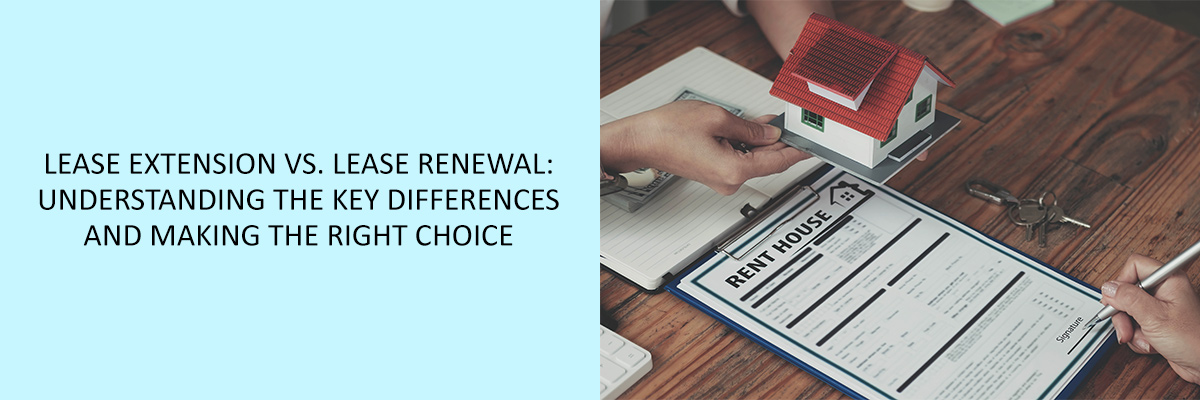Whether you’re a property manager, landlord, or tenant, navigating the complexities of leasing agreements is an essential part of maintaining a successful rental relationship. Among the many terms you’ll encounter, lease extension and lease renewal are two that often cause confusion.
While they may sound similar, they carry distinct implications for both parties involved. Understanding the differences between these two options is crucial for making informed decisions that align with your goals, whether you’re aiming for stability as a tenant, securing long-term revenue as a landlord, or managing multiple properties effectively.



This blog aims to clarify the differences between lease extension and lease renewal, helping property managers, landlords, and tenants make informed and fair decisions that promote equitable housing practices.
If you’re interested in learning more about topics such as fair housing, affordable housing, HUD regulations, or construction housing, be sure to check out our webinars. These on demand and upcoming webinars feature valuable insights from industry experts, providing essential information to help landlords and property managers fulfill their responsibilities effectively and ethically.
What is a Lease Extension?
A lease extension refers to an agreement between a tenant and landlord to prolong the duration of an existing lease. In this scenario, the original lease terms, such as rent amount, property usage rules, and maintenance responsibilities, generally remain unchanged unless both parties agree to modify specific clauses. Essentially, the extension continues the life of the original contract, extending its end date while maintaining its framework.
Lease agreement extensions are typically used when both the tenant and landlord are satisfied with the current arrangement but want to keep the flexibility of making changes in the future.
Key Points:
- Original lease terms largely stay intact.
- Only the lease’s end date is extended (unless otherwise agreed).
- Offers continuity with minimal administrative effort.
What is a Lease Renewal?
A lease renewal, on the other hand, involves creating a new lease agreement that replaces the existing one. This means that the landlord and tenant enter into a brand-new contract, which can include updates to terms such as rent, duration, and other conditions. A lease renewal often presents an opportunity for landlords to adjust rent or address concerns, while tenants may negotiate more favorable terms for themselves. For example, changes in eviction protocols that cover points such as what to do when a tenant fails to pay the due rent.
Renewals are particularly useful when circumstances have changed, or when a longer-term commitment is desired by either party.
Key Points:
- A new lease agreement is created.
- Terms such as rent or lease duration can be renegotiated.
- Provides an opportunity for updates or adjustments.
Key Differences Between Lease Extension and Lease Renewal
| Aspect | Lease Extension | Lease Renewal |
| Contract | Keeps the original lease intact. | Creates a brand-new lease agreement. |
| Terms | Terms remain largely unchanged. | Terms can be renegotiated. |
| Administrative Effort | Minimal, as it modifies an existing lease. | More effort, requiring a new agreement. |
| Flexibility | Suitable for short-term continuation. | Better for long-term arrangements. |
| Time Point | Typically occurs before the lease expires and seamlessly extends its terms. | Usually happens at or after the lease’s expiration, marking the start of a new contract. |
Which Option is Better for Landlords and Tenants?
For Landlords:
- Lease Extension: Best for maintaining stable rental income without major administrative effort. It works well when the tenant is reliable, and there’s no pressing need to adjust terms.
- Lease Renewal: Ideal when market conditions allow for higher rents or when new lease terms could enhance the property’s profitability.
For Property Managers:
- Lease Extension: Simplifies the administrative workload, making it easier to manage multiple properties and maintain tenant satisfaction without the complexity of drafting a new agreement. It’s particularly beneficial when both the tenant and landlord are content with the current arrangement.
- Lease Renewal: Offers property managers an opportunity to reassess and align lease terms with market conditions. It can also help in addressing any existing issues, ensuring the property remains competitive and profitable in the long run.
For Tenants:
- Lease Extension: Favorable if you’re happy with your current terms and want to maintain flexibility. It avoids the hassle of renegotiation.
- Lease Renewal: A good choice if you’re seeking long-term security or want to negotiate better terms, such as reduced rent or added amenities.
Making the Right Choice
Ultimately, the decision between a lease extension and a lease renewal comes down to individual needs and circumstances. Landlords should consider their financial goals, tenant reliability, and the current market.
Tenants should evaluate their satisfaction with the current terms and their long-term plans. Property managers, meanwhile, play a vital role in facilitating discussions, ensuring clarity, and helping both parties reach agreements that work for everyone.
By understanding the nuances of lease extensions and renewals, all parties can confidently navigate the leasing process and make choices that support their objectives.


